According to the Global Organized Crime Index for 2025, published by the Global Initiative Against Transnational Organized Crime (GI-TOC), North Macedonia ranks among the countries with the lowest crime level in the Western Balkans, with an average crime score of 5 points on a scale from 1 to 10.
Criminal markets in the country are assessed with 4.8 points, while criminal actors – including criminal networks, mafia groups, state-embedded actors, private actors and foreign actors – receive a slightly higher score of 5.2 points.
Among the most problematic indicators for North Macedonia are migrant smuggling, cannabis trafficking and financial crimes (each scoring 6 points), followed by human trafficking, synthetic drug markets and cybercrime (each scoring 5.5 points).
In terms of resilience indicators, North Macedonia has the strongest performance in the Western Balkans with 5.29 points. The highest-rated indicators are international cooperation and territorial integrity (6.5 points), anti–money laundering efforts (6 points), law enforcement, prevention, and non-state actors (each with 5.5 points).
The report, published every two years, shows that the country remains a key node along the Balkan drug routes, including heroin, cocaine, cannabis and synthetic drugs. Albania serves as a transit and distribution point for Afghan heroin toward European markets, with criminal groups controlling the traffic from Afghanistan, Iran, Turkey and Pakistan, while most heroin enters through North Macedonia and Kosovo. Domestic consumption remains limited, but the trade generates significant profits and is facilitated by corruption at border crossings.
Serbia ranks first for criminality, North Macedonia shows the highest resilience
Compared to neighboring countries, Serbia has the highest level of criminality in the region with 6.18 points, followed by Bosnia and Herzegovina (5.92), Montenegro (5.82), Albania (5.20), North Macedonia (5.00) and Kosovo (4.85).
In criminal markets, Serbia (5.67) and Bosnia (5.43) have the highest scores, while North Macedonia (4.80) and Kosovo (4.70) have the lowest levels.
In terms of resilience to organized crime, North Macedonia performs better than the entire region with an average of 5.29 points, ahead of Bosnia (3.88), Montenegro (4.83), Serbia (4.92), Kosovo (4.92), and Albania (5.17).
Main criminal markets in North Macedonia
The report highlights that migrant smuggling continues to function as a highly organized and transnational activity, with North Macedonia serving as a key link along the Western Balkan route toward Western Europe. Smuggling networks primarily facilitate the movement of migrants through the border with Greece, using major transit points such as Gevgelija and Kumanovo. These criminal networks maintain strong regional ties, particularly with actors in Turkey, Greece, and Hungary.
The Index also emphasizes that North Macedonia primarily serves as a transit country for heroin, being part of trafficking routes that connect Afghanistan with Western Europe through Turkey and the Balkan region. Although the domestic heroin market is relatively small, the country’s strategic position makes it an integral part of the regional supply chain.
Regarding cannabis trafficking, the report notes that legal and illegal cultivation coexist, with criminal networks exploiting regulatory gaps in the medical cannabis industry. Although the government has issued cultivation licenses, there are reports that some licensed entities have been involved in the illegal distribution of cannabis. Corruption has further complicated oversight, and North Macedonia remains a key transit point for cannabis shipments from Albania toward European markets.
The Index also observes the rise of technology-driven cybercrimes in North Macedonia, primarily conducted by organized crime networks. These networks engage in various activities, including cyberattacks such as DDoS attacks, ransomware, and the use of malicious software. This criminal market is consolidated and includes both domestic actors and foreign groups, particularly from countries such as Russia and Iran.
Note: The Index covers only UN member states. However, Kosovo is assessed but is not included in the official ranking or report.



